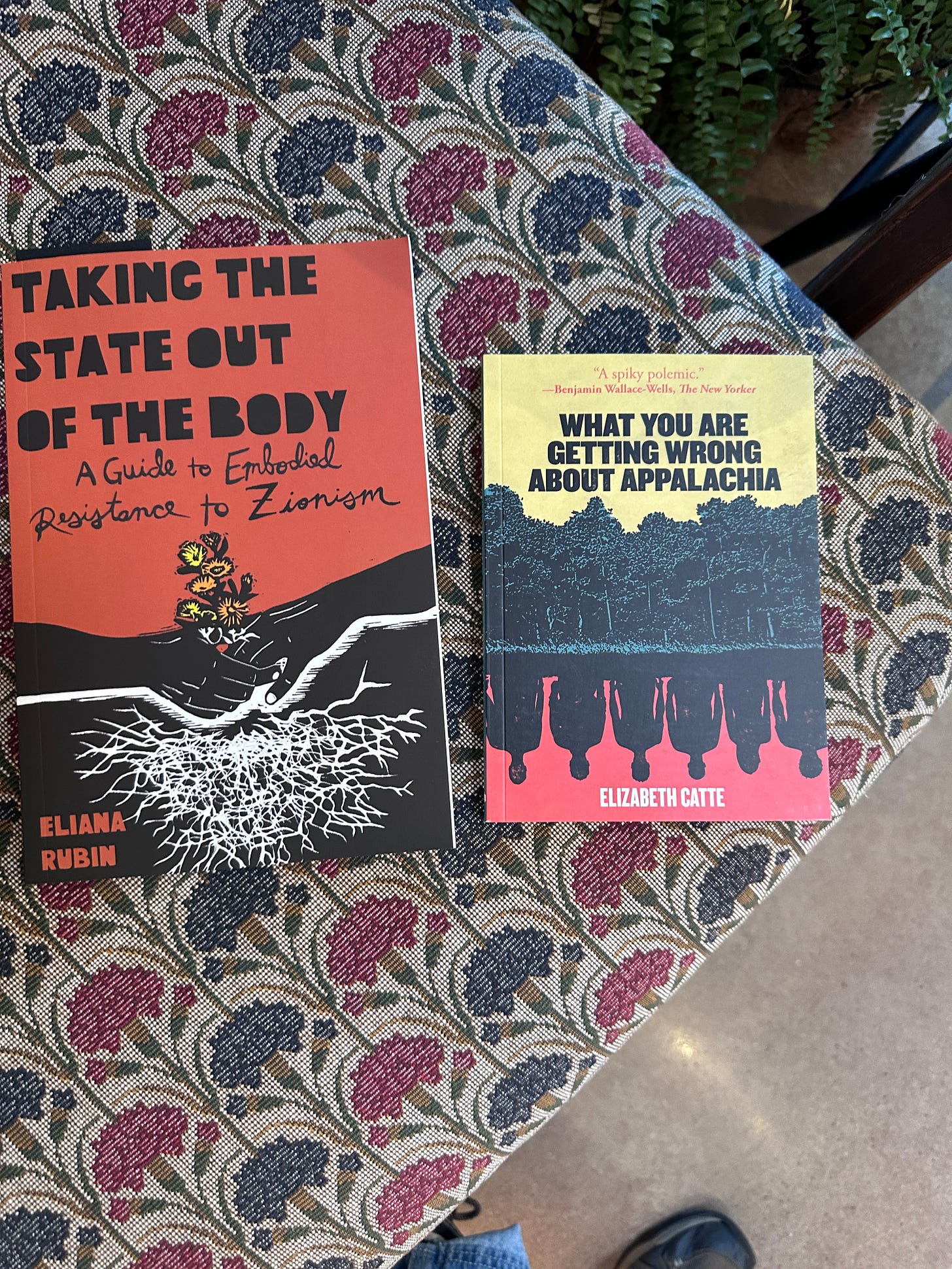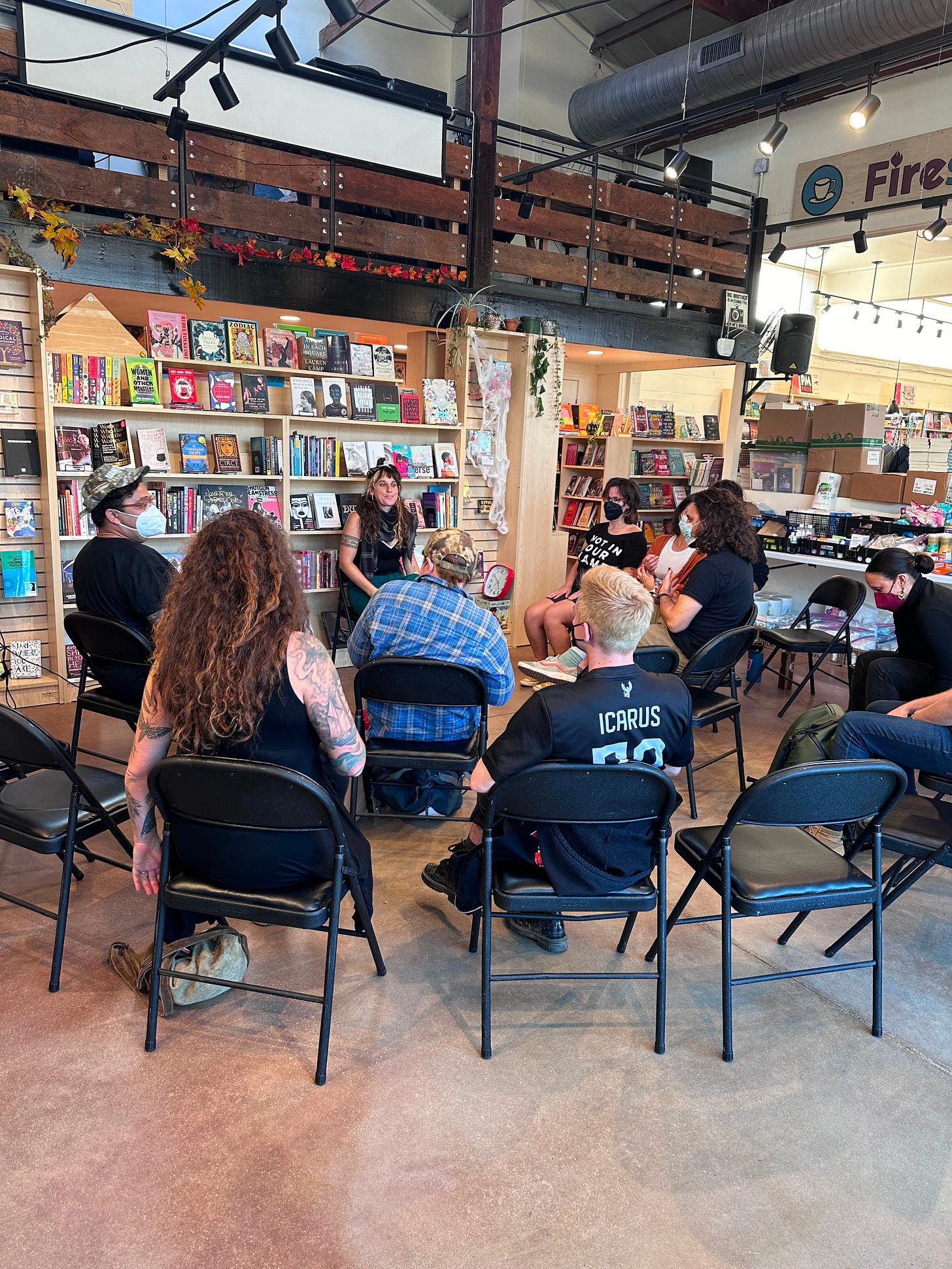The Distance Between Eastern Coasts - Letter Two
A letter exchange with Farrah Berrou that unpacks how our two homes are undergoing linked crises.
This is part 2 in a 6-part correspondence between Lebanese-American writer, Farrah Berrou, and me, Kara Daly. Farrah will be writing parts 1, 3, and 5 on her Substack, A’anab News, and I will respond in parts 2, 4, and 6 here.
Links will be added as the letters get published: letter 1, letter 2, letter 3, letter 4, letter 5, and letter 6. A final recap post will be shared late-November.

Hey Farrah,
Thank you for your letter; it’s really good to hear from you. You did the heavy lifting of introducing this topic (that wasn’t originally planned for) in a way that is both grounded in fact and held with love. It’s an honor to write these letters with you—one, because I love your writing and two, because letters are, to me, the most sacred form of communication. Since I was a kid, I’ve turned to them in times of conflict for their ability to facilitate deep listening for the reader and the marriage of thought and feeling for the writer.
The conflict here isn’t with each other, instead, we’re both reckoning with two interlinked tragedies, as you said. Along with the other people in Lebanon and Gaza, you’re bearing the brunt of this conflict as you watch your home be destroyed by Israeli forces and face daily threats to your safety. I’m here in Western North Carolina, about a month after one of the U.S.’s deadliest hurricanes of modern times caused the rivers to crest to historic heights, sweeping entire towns away. Election Day is tomorrow, new voting locations have opened where old ones no longer exist, and I can only speak for my liberal friend group when I say: anxiety is high.
In the first week after the hurricane, I thought of you a lot, as I watched myself go from being on the outside of the explicit suffering that late capitalism creates to being on the inside of it looking out. I feel as though I’ve gone from seeing the writing on the wall to becoming the writing on the wall. It hasn’t changed my views on the election, as they’ve remained just as cynical as they were before the flood, and those around me have only dug their heels into the ground. But it has clarified my disdain for industry and my understanding of climate change. The biggest shift for me is that I now understand the significance of mutual aid, even though I don’t fully know what my place in it is—maybe this is it. Is being a writer enough?
Speaking of writing, you made a really good point about how language can be a weapon. Since October of last year, I’ve gotten into arguments with people over my use of the word “genocide” and watched the collective tip-toe around it. Your example of how the term “humanitarian crisis” has been used to avoid naming the aggressor directly (Israel), reminds me of how the term “sexual assault” is often used to describe rape. It’s the choosing of a sanitized word or term to describe the thing, and in doing so allows us to talk about it without actually digesting the truth of it. I wince when people refer to Hurricane Helene hitting the Blue Ridge Mountains as a “natural disaster”. This disaster is a consequence of human-driven climate change. We have the data to understand this, just as we have the data to understand the environmental impact of war—with that knowledge, each disaster is one we choose.
Donate to the mutual aid fund for Beirut’s relief kitchens who are preparing thousands of daily meals for the 1.4 million internally displaced people of Lebanon.
When the hurricane first hit us, I was writing about how the wine businesses left standing have been isolated from their market, which is entirely fueled by tourism. One of the things I’ve learned over the past month is how a history of extraction plays into our disempowerment. In a recent conversation about Appalachia with Mergoat Mag on Instagram, Chelsea White-Hoglen of the Red Necks Rising Podcast said, “As long as settler colonialism has existed, these mountains and their people have been targeted for violent displacement, commodification, and extraction.” Last night, I attended a book talk by organizer and author Eliana Rubin, for the release of their book, Taking The State Out Of The Body: Embodied Resistance to Zionism. In their book, they write: “Originally a British imperial project, Israel is now heavily funded and backed by the United States, which then profits from the occupation of Palestine. The United States uses Israel as an ally for resource extraction and militarism and as a beacon of imperialism in the Middle East.”Is this something you think about with regard to Lebanon?
I’m still learning about Lebanon, having found your work on my journey to following wine history back to the beginning of time. One thing I’ve learned is that I really can’t talk about wine without understanding its context, and that means I have to learn…the history of the entire world?
I suppose this brings me to the Wine Writers’ Identity Crisis (WWIC), which I’m not surprised is in your notes, too—I wonder how many wine writers struggle with this. For me, studying wine has connected the dots between wine and the rest of life completely on its own. Recently, the argument of, “wine writers shouldn’t write about politics” has resurfaced again. Would anyone ever suggest that a food writer refrain from discussing the political contexts of the food they write about? Are we aware that wine writers are food writers?
The irony, to me, is that the wine industry is scrambling to remain relevant, meanwhile, crickets have been humming for an entire year while a genocide has been taking place in one of the most historic regions of the wine world. This idea that we shouldn’t participate in political writing (as if wine writers aren’t perfectly equipped to address complicated topics) is keeping us from connecting with the real, lived world of the thing we say we care so much about.
I feel off about the Come Over October campaign too. Even though I think the intention was right (to communicate that wine can be a centerpiece of important moments), the execution didn’t work for me. Because Sober October is an already existing campaign, Come Over October feels icky at best. I can’t ethically talk over someone interested in exploring moderation and sobriety, and choosing the same month feels like an attempt to do that. I’m totally in support of anyone who wants to drink less, and like you, I see no need to be on the defense about how wine fits into real life.
I have a friend who gave up drinking years ago, and our conversations drift in and out of wine, food, climate change, corruption, relationships, mental health, and art. I don’t try to make wine a part of our conversation, but because it’s the primary lens through which I study the natural world, we go there sometimes. I’m curious: have you had any meaningful conversations about wine with people in your life who don’t drink it?
I know that you share my WWIC because you’ve been grappling with this since (before?) we became acquainted. I think the very existence of a WWIC is proof that we, in the wine community, have created the disconnect that alienates us from our audiences. We should be able to seamlessly move in and out of the topic, aware of how the whole is connected. Right now, for me, that looks like talking about how climate change has intensified storms and decimated my very environmentally-conscious community. And it also looks like grieving the destruction that your home is facing. I wish I were able to come experience the food, the wine, and the olive trees that you write about.
In an evacuation, I don’t know if I would grab the wine, but I probably wouldn’t grab a wine book. Ha! Put that on my gravestone. At the beginning of the year, I started to slowly build a go-bag—it’s currently incomplete. The only book I have in there so far is a collection of poetry: Louise Glück’s The Wild Iris, so I suppose that is currently the most important book in my home. Since you ended with a poem, I’ll leave you with the title poem of that book.
Thank you for the birthday wishes; it was a peaceful evening with food, wine, cider, a bonfire, and a few friends.
Stay safe, talk soon.
Kara



